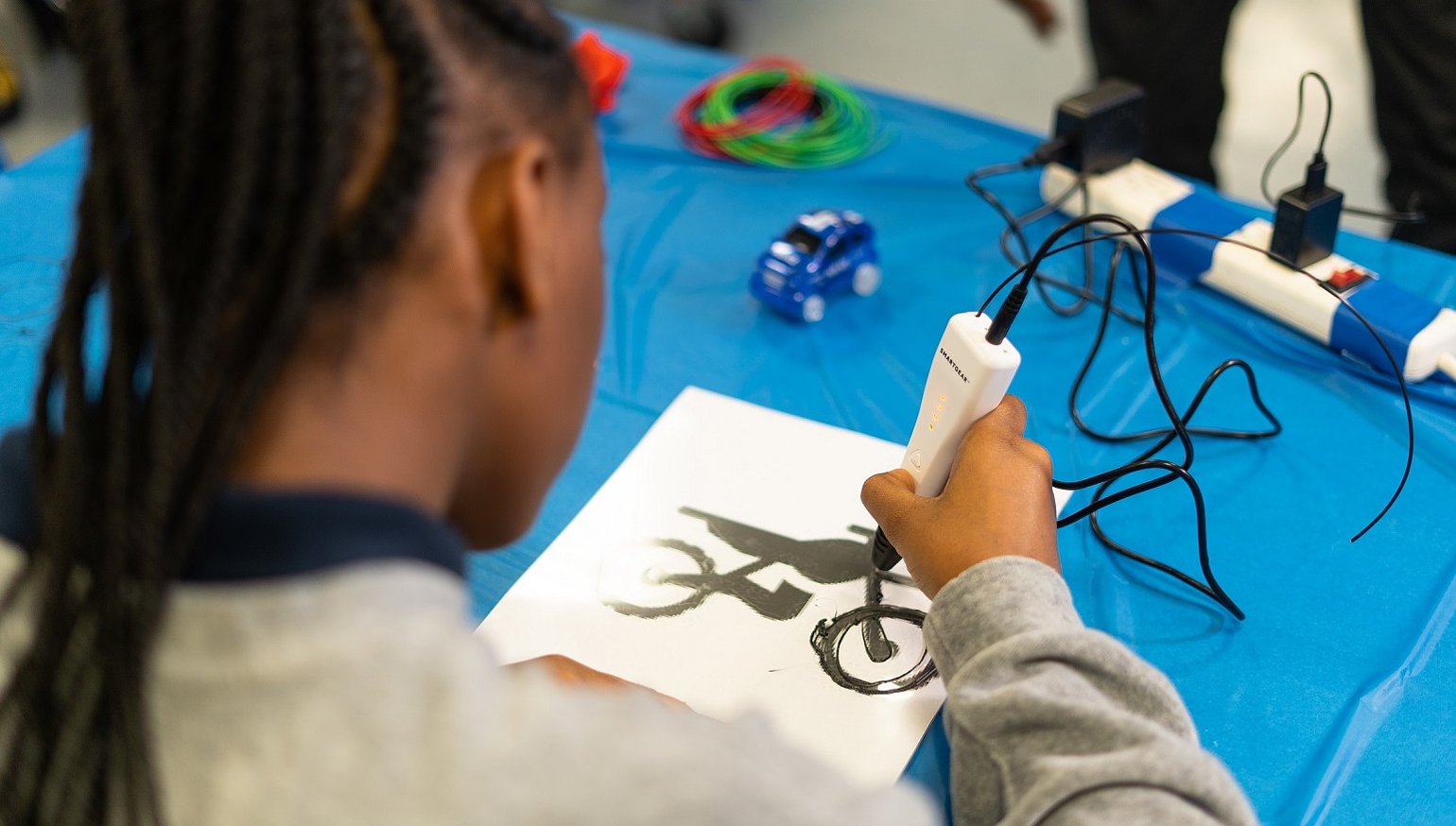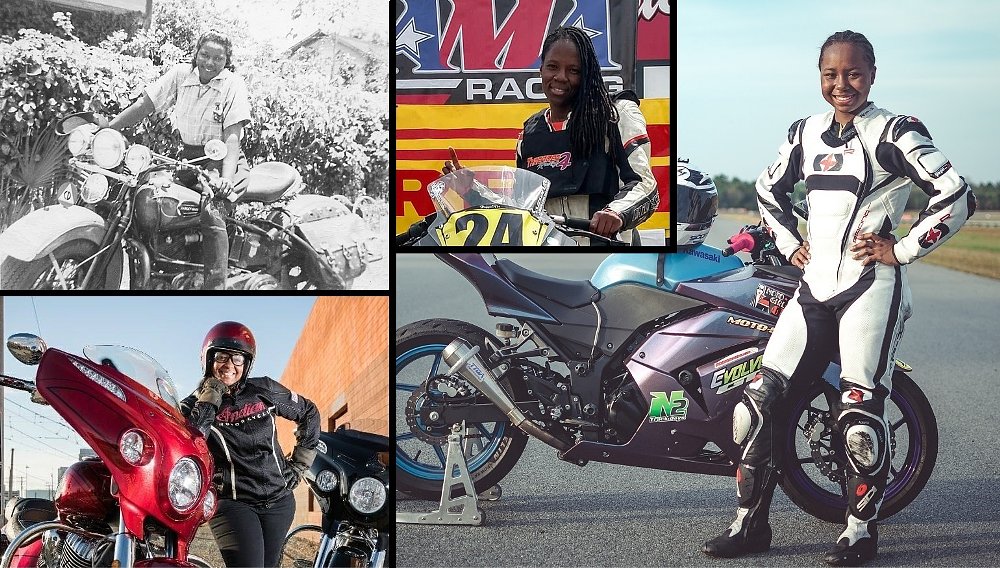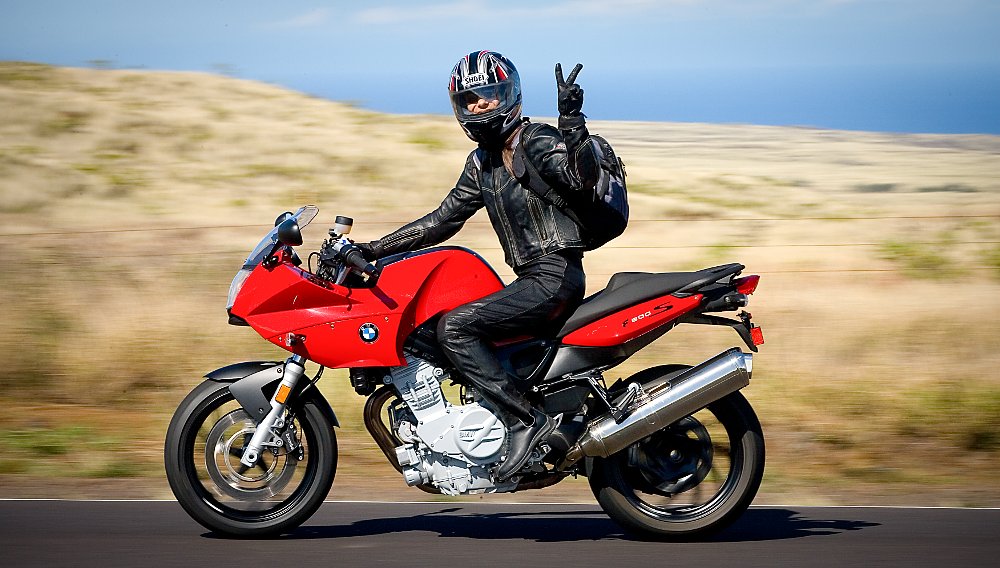A few years ago, the documentary film 12 O’Clock Boys made Baltimore’s African-American dirt bike scene famous — or notorious, depending on your point of view. Since then, that uniquely urban dirt bike culture’s been dramatized in the HBO Max film Charm City Kings and has spread to nearly every major U.S. city.
Scores of riders and many more spectators spent Sunday afternoons in Baltimore’s Druid Hill Park, where stunt rider flash mobs devolved into bikers-versus-cops chases until one chase ended in a fatality. After that, the Baltimore Police Department stopped chasing them, but Baltimore made even possessing a dirt bike a misdemeanor.
One of those spectators was Brittany Young. She tried riding once, fell off, and decided it wasn’t for her. She refocused on her education, attending a high school that specialized in STEM education, and a local college where she took (and later instructed) science and engineering courses.
Young’s little brother was incarcerated for a non-violent offence when he was 16. In 2015, riots followed Freddie Gray’s death in Baltimore police custody. She wondered if there was anything that she could do to break the cycle of urban poverty, educational failure, petty crime, and prison that had played out around her for her whole life.
Brittany Young’s brainstorm was realizing that kids riding and repairing dirt bikes were basically already living out real-world STEM experiments; popping a wheelie is physics, internal combustion is chemistry, modifying bikes is engineering. She formed a non-profit called B-360 and developed a curriculum that harnessed urban kids’ interest in dirt bikes and channeled it into STEM education and job training.
Since 2016, B-360 has worked with more than 7,000 students who have shown significant improvements in Maryland’s standardized tests. Thirty-six former street riders have been trained and employed as instructors. Recently, the organization has been loaned the use of a space where stunters can practice away from traffic. In the last year there’s been a significant decrease in dirt bike arrests.
The program has attracted more than just kids on dirt bikes. Young was selected as a participant in Johns Hopkins University’s Social Innovation Lab "Accelerator" program; she’s been applauded by media outlets from Vice to Wall Street Journal; Red Bull produced a slick video after naming her one of its "Changemakers" and Toyota featured her in a video that ran as part of its Supercross sponsorship. The first time I set up an interview with her, I was bumped because she had to take a call from the producers of the Today show.
Even the staid American Motorcyclist Association named Young the recipient of its 2021 Bessie Stringfield Award, given to individuals "who have introduced motorcycles to emerging markets."
But considering how much the U.S. motorcycle industry craves "non-endemic" exposure (mainstream press), it’s conspicuous that no OEM has stepped up as a sponsor. B-360 doesn’t get any support from parts and accessories companies, either. That was what I wanted to talk to her about.
Thank you @brittanybritto for our profile on the front page of @baltimoresun : https://t.co/Pa5fWo18GK pic.twitter.com/xMzWrAyBzb
— B-360 (@B360Balt) December 10, 2018
Mark Gardiner: There's lots of mainstream media interest in B-360. Has the motorcycle industry reached out to you with any offers of help?
Brittany Young: The short answer so far has been "No." Bessie Stringfield was the first black woman inducted into the [AMA] Hall of Fame, but in the 20-plus years they've been giving the award out, I'm the only black person who's ever won it. That speaks to how behind the motorcycle industry is; they have yet to see the value in people like me. I would love to have partnerships with the Hondas, the Kawasakis, the KTMs, and the RevZillas, but we haven’t seen that because [pause] I don't know why.
Editor's note: Since this interview took place, RevZilla’s philanthropic arm, Comoto Cares, has finalized a $10,000 no-strings-attached donation to B-360 and is working with the nonprofit to find additional opportunities to strengthen this partnership.
CT: Is it that people in the motorcycle industry are put off by the imagery associated with the Baltimore scene and urban riding in general?
BY: Our imagery isn't the same. That's the most basic and clear point. There are people who ride Harley-Davidsons recklessly, but Harley-Davidson is a respected brand and manufacturer. B-360 is not responsible for all of the people that are doing it the wrong way. We're responsible for making sure that there is an opportunity to do it the right way.
If Honda, Kawasaki, or Harley-Davidson want to be around 10, 20 years from now, if they don't work with us, they won't have an industry. It’s a $32 billion industry that right now does not have this style of riding. It could be $100 billion with this style of riding because it’s only growing. But if you don't sow seeds into supporting the future of [urban dirt bike riding] you won't have it.
And instead of concentrating on people that do it the wrong way, they should focus on people that do it the right way. And that's us. So all of our kids and our young adults wear helmets. We create space to ride safely. It's not about riding in the streets at all. There's nothing wrong with popping wheelies. We see it in the X Games.
And like you're saying, we have the most media and the biggest digital footprint of any motorcycle-based organization. All we're missing is the actual motorcycle industry behind us. So I don't know how I can win the Bessie Stringfield Award and no one even knows about it. But I think that speaks to the motorcycle industry still having work to do.
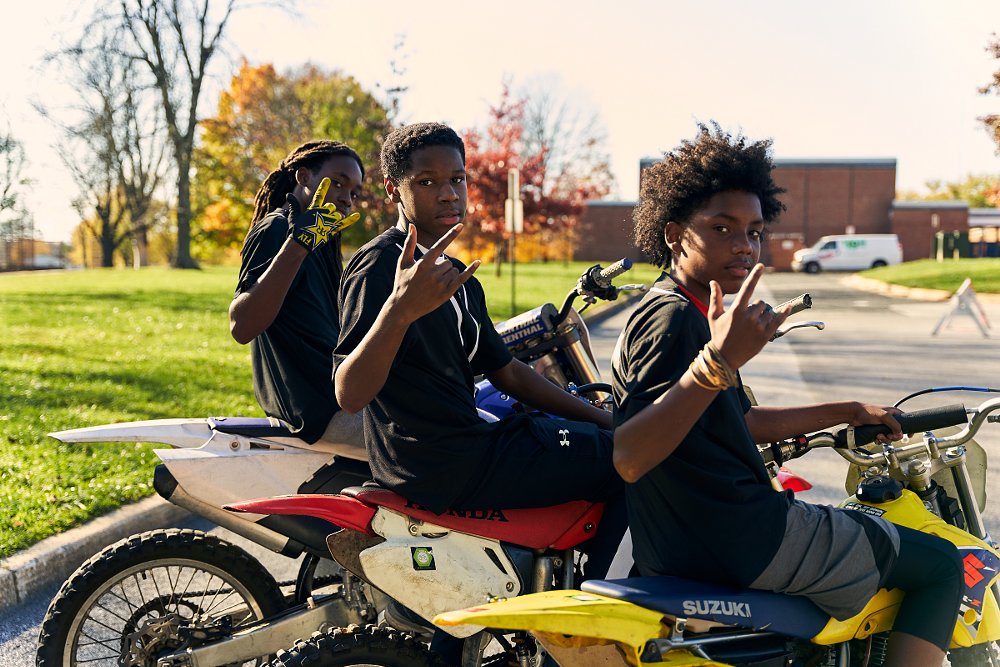
CT: If you did get meaningful support from the motorcycle industry, what could B-360 achieve in the next five years?
BY: I want to start with what we’ve already done right here in Baltimore. Instead of having a police task force to arrest people and confiscate dirt bikes, we now have diversion program with the city attorney’s office. So people with non-violent offenses do a training program with us and we make sure they have a job.
We now have three acres of land thanks to a private partnership that will allow people to ride safely and a place to run our programs, and where people can train to repair dirt bikes. We just did our first dirt bike show with sponsorship from Red Bull.
In five years I’d like to see people coming to dirt bike shows the same way that go to see the X-Games or motocross. We’re launching a campaign for a larger space — a campus — where we’ll be able to have indoor and outdoor riding events, and teach people how to repair dirt bikes.
The motorsports industry does not support this style of riding right now. So we want to work intentionally with corporations around issues like, how do you make helmets for people with hair like mine? How do make dirt bikes for people that may come from lower incomes? But if you don't have anyone like me at the table, you'll be missing out.
A lot of companies — I won’t say which ones — love to have this style of riding in their marketing campaigns but they don’t want to sow seeds to make sure those same types of riders don’t just end up in jail. Companies are also preying on the power of black dollars and black media and black entertainment, but haven't yet fulfilled their obligation to sow seeds back into black communities. I don't know how many more movies can be made about the style of riding. I don't know how many more [ad] campaigns can be made. There comes a point where we have to say no more, because what do riders actually get?
CT: What’s your take on the 12 O’Clock Boys documentary and the Charm City Kings dramatic film?
BY: My take is, what do the riders get at the end of the day? The 12 o'clock documentary created an explosion of this style of riding but the riders in Baltimore only faced stricter policies. Charm City Kings filmed in Baltimore for four months. The film-makers offered B-360 a $1,000 donation. And the experience of black people is not a monolith. So I would love to see more stories being told about the riders; hearing about their own experiences, because I think that's what's missing.
Hollywood tells the same tragic story about black people and that’s especially true for black people in Baltimore. What I want people to realize is that dirt bikes are not synonymous with guns and gangs and crime.
What we're seeing in cities is a residual loss of investment in black communities. How much more money will be made off a group of people before money gets sowed back into them? Motocross riders make six figures, but black dirt bike riders don't get anything but policed.
CT: When did you learn you’d won the AMA award and what has come of it?
BY: In 2019 we were featured in a magazine [American Motorcyclist, December 2019]. We were the first black people in this style of riding that were ever featured. And that's why I said has been I think it's been a long overdue conversation.
Then in November of 2020, they told me I was going to win the award. I'm like, OK, hopefully I can convince them to be on the board. And then I looked at the list and I realized I was the first black winner. OK, clearly the industry is changing. But it is July, I just got presented my award; there was no media about it. That’s where the AMA could come in. If this award actually has meaning, let's make sure we don't just put lip service to it, but actions to make sure that there's actual tangible results.
I don't need more awards. What I really need is investment, not just financial, but into growing this company that I started. And I don't think right now I had that support from the AMA and I don't have that support from the motorcycle industry, because I've seen what has been done for motocross and the X Games. What is different about us other than the color of our skin?
Bessie would not have believed that 50 years later another black woman would also be sitting in the same seat with the same issues. What I can promise is that in my lifetime, with or without the help of the motorsports industry, we will get this right.
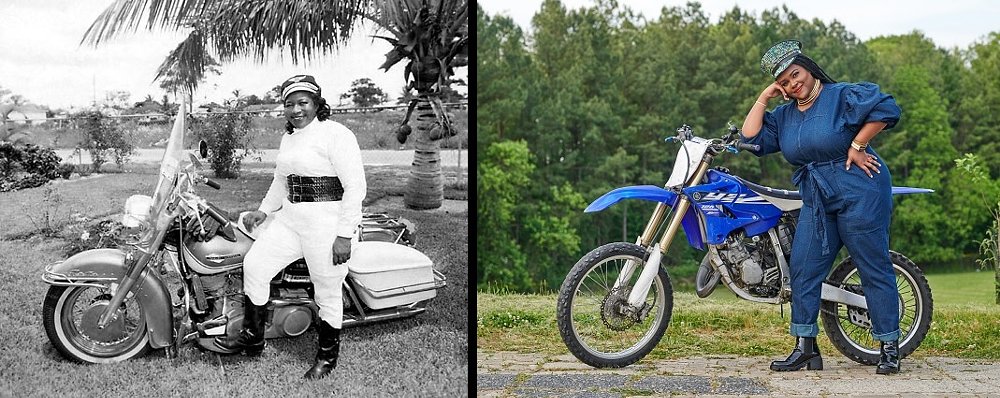
We’ve never had an issue with police. We had an issue with policy. The policy in Baltimore is, it can be a misdemeanor to even possess a dirt bike, even if you’re not riding. I would like to work more closely and more intentionally with the Baltimore PD and all the stakeholders, all the different city agencies, to make sure we have short, medium, and long-term solutions. I would like to see more community work being done, because if you sow more money into programming, you spend less money on incarceration. I can comfortably say we have the same goals as the police, which is to have less dirt bikes in traffic.
I've always been really big on my own community, my own network. I can't fix all the world's problems, but this one issue with dirt bikes can be solved and done right in my lifetime. And I feel like there's a million Brittany Youngs across the country; a million people who want to see cities be better.
Is it time for manufacturers to get involved?
I remember when it was illegal to ride skateboards on almost any property, public or private, in most cities. Now, there are skate parks everywhere. I remember when snowboarders were vilified at ski resorts; now it’s an Olympic sport.
I’m not suggesting that wheelying dirt bikes on the street will ever be an Olympic sport; it won’t be. In the course of our conversation, Young suggested that this kind of riding might be as big as motocross in five years. I didn’t have the heart to tell her that the way things are going, even motocross won’t be as big as motocross. As far as I can see, stunt shows and competitions, whether on dirt or asphalt, peaked years ago. The whole X-Games franchise is for sale.
At one point in our conversation, Young asked and answered a rhetorical question: "Was I just given the award because they needed to have a black face following 2020's uprisings? With all that’s happened already with black people and then motorcycling for black people, this feels very superficial."
So is it time for OEMs, parts and accessories companies, and rich sponsors like Red Bull and Nike to get out ahead of the urban dirt bike phenomenon — and not with awards or slick videos, but with money and action?
One reason it hasn’t happened yet is that there’s a prevalent belief across OEMs, dealers, and amongst (predominantly white) riders that most of the dirt bikes on Baltimore streets are stolen. But a few years ago when I asked the Baltimore PD if it that was true, an official spokesman surprised me by emailing back, "No. I don’t think that’s accurate at all. The 12 O’Clock Boys don’t necessarily represent all dirt bikes in Baltimore."
Another argument may be that even if B-360 does good, a big part of the attraction of "popping wheelies" is specifically that it is illegal, so gatherings on public roads will continue. It might be hard to support any urban riders without being seen as pro-anarchy.
“You don’t worry about nothing when you’re on the bike. Because when you’re on the bike there’s adrenalin, you’re having fun. You’re just free. That’s what comes to mind. You’re just free.” pic.twitter.com/iccKv5hhRX
— Cassandra Giraldo (@CassGiraldo) July 13, 2021
But B-360’s experience suggests that at least some urban dirt bike riders want places to ride, gear, and training to do so safely — and that in the process, kids’ energies can be directed into education and skills development that will ultimately reduce profound inequities. The motorcycle industry is uniquely positioned to work with organizations like B-360 to help broker a safer, more peaceful, and productive coexistence between at least some riders and cops.
The reason the moto industry should get involved isn’t because it’s an easy PR move in the wake of #BlackLivesMatter or because it’s going to grow into a thriving new category of motorcycle sport. It’s because urban dirt bike riders get all the same things out of motorcycles that more privileged riders get: A sense of camaraderie, freedom, a break from mundane and constricted lives, adventure and thrills, and an endless opportunity to improve skills both on the bike and in the garage.

 Membership
Membership

